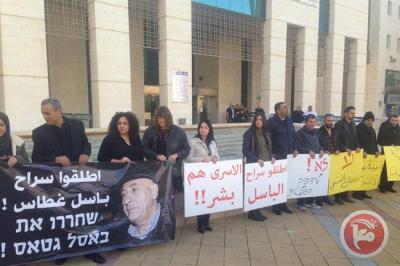
Israel: protest vigil for detained Palestinian MK

Dozens of activists on Dec. 26 demonstrated outside the Israeli magistrate court in the central city of Rishon Lezion in support of a Palestinian member of the Knesset, Basal Ghattas, after the court extended his detention another day. Ghattas, a member of Joint List which represents parties led by Palestinian citizens of Israel in the Knesset, was arrested on suspicions of smuggling cellphones to "Palestinian terrorists" serving time in Israeli prisons, and is being charged with "conspiring to commit...violations of Israel Prisons Service orders." Protesters raised photos of Ghattas and posters criticizing the Israeli government in both Hebrew and Arabic. Palestinian members of Knesset Haneen Zoabi and Jamal Zahaika attended the protest before they entered the court hall to attend the hearing.
Meanwhile, the Minister of Public Security Gilad Erdan said that Israeli police would continue interrogations with Ghattas for what he described as "extremely dangerous acts," adding that anyone who has violated the law and smuggled phones to "killers held behind bars" must be aware that these actions can lead to "terrorist attacks."
A statement released on behalf of Ghattas at the time of his arrest stated: "This is a vengeful and arbitrary arrest, because the police, [Prime Minister] Netanyahu and [Public Security] Minister Erdan want a photo of an Arab MK in handcuffs."
"The arrest is a political move and is not necessary to the investigation. Fairness obligates to treat an Arab public representative just like a Jewish one, and that is not the situation here," the statement added.
Ghattas was stripped of his parliamentary immunity on Dec. 21, with the Israeli Attorney General stating that Ghattas had "passed envelopes to security prisoners," leading Israeli prison authorities to confiscate the envelopes which allegedly contained "12 cell phones, 16 SIM cards, two cell phone batteries, and headphones," according to YNet.
Meanwhile, there are 7,000 Palestinians currently being held as political prisoners in Israeli custody, according to prisoners' rights group Addameer. Any correspondence with Palestinian prisoners held by Israel can be considered an act against the security of the state, making it dangerous for both Palestinian citizens of Israel and those holding Jerusalem permits to engage with Palestinian prisoners held by Israel.
Critics have said that Ghattas' arrest represents the latest event in a concerted crackdown on Joint List MKs in an attempt to squelch opposition to the Israeli government's right-wing policies in the occupied Palestinian territory. In June, the Knesset passed an anti-terrorism billthat the Joint List called "draconian and unacceptable." The law includes a provision expanding the definition of "terrorist organization" membership to include “passive members" who are not actively involved in any group, but can now be indicted by Israeli authorities.
The bill also includes a provision that gives the defense minister—currently Avigdor Lieberman, notorious for this ultra-right views—the power to confiscate property of alleged members of terrorist organizations without getting approval by Israeli courts.
Furthermore, in July, the Knesset passed into law a bill that allows MKs to vote to oust their colleagues from office—legislation that has been slammed by critics as targeting Palestinian MKs and harmful to "the very building blocks of democracy."
The bill was first introduced after Palestinian MKs paid visits to the families of Palestinians killed by Israeli forces after they carried out attacks, with Israeli Prime Minister Benjamin Netanyahu saying in March the law would be used to suspend MKs who "stand behind terror."
The legislation regained traction after Balad MK Haneen Zoabi enraged lawmakers by calling Israeli soldiers who participated in the 2010 deadly raid of the Turkish aid flotilla to the Gaza Strip "murderers," and was forcibly removed from the plenum for her comments.
In response to the incident, Coalition chairman David Bitan of the Likud party, with the support of Netanyahu, unsuccessfully tried to shelve the suspension bill in exchange for a law designed simply to oust Zoabi.
The Knesset also passed the "NGO bill" into law in July, as human rights groups and opposition Knesset members condemned the legislation for seeking to "silence criticism" of Israel and delegitimize left-wing groups.
The actions against the Joint List—formed last year when four Palestinian parties joined to fight for the rights of Israel's Palestinian minority—and other left-wing organizations in Israel have laid bare a deep rift in Israeli society as the extreme right-wing has gained traction on the Israeli political and social scene.
From Ma'an News Agency, Dec. 27.
